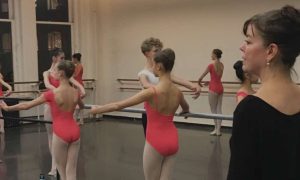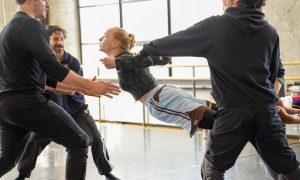The performing arts are a difficult business. One day you’ve got a wonderful, well-paying gig, and the next, you’re back on the audition circuit, hustling for your next job. People will say that dancers are so lucky to be pursuing a career doing what they love. In a way, they’re right! But it’s both a blessing and a curse. Having a vocation — our careers incredible pressure. We are so invested in our art that, often, success in our careers directly correlates to our self-worth. Here’s some advice on how to deal with a dry spell.
#1. Reevaluate your priorities.
Sit down and write out your weekly schedule. Notice what is taking the most time, what is causing stress and how you are managing your free hours in the day. In your mind, dancing is certainly your top priority. But when you take a look at your actual day-to-day goings on, you might realize that your side job, late nights out with friends and shopping sprees are keeping you from class and auditions. Financial stability, entertainment and spending time with friends are all incredibly important to your life, but it’s also necessary to find a way to manage these parts of your life to fit in with your career goals. Limit yourself to one drink at happy hour with your best friend, put $20 toward ballet class instead of getting your nails done, and talk to your manager about scheduling your side gig for nights and weekends so you can attend morning auditions during the week. You can do it all (or, at least, a lot) if you analyze your goals and schedule your time and energy efficiently.
#2. Get reinspired.
For some of us, it can be hard to call ourselves “dancers” when we are not actually working as professional dancers. Taking class and attending audition after audition can be tedious and draining. Step back from the studio to get reinspired by the art form you love so much. Invest in tickets to a dance performance or, if money’s tight, simply turn to YouTube! Watching your favorite dance films and performances (Singin’ in the Rain, Michael Jackson on tour and the YAGP championships…just to name a few of ours!) can reignite your love of dance and get you itching to be back in the studio yourself.
#3. Acknowledge other interests.
Putting all of your eggs in one basket might not be the smartest or healthiest choice. That’s not to say that you’re any less passionate or dedicated to your career. But tuning in to what else makes you happy can both bring more joy to your life and expand your opportunities. Whether it’s singing, cooking, reading, photography, seeing movies, yoga, visiting museums or blogging, investing some time in things that make you happy — other than dance — will add dimension to your life and take some of the pressure off.
#4. Get some feedback.
Enroll in an audition workshop class (such as those offered by The Growing Studio and Stage Door Connections) to work on your craft (dancing, singing or acting), and receive constructive criticism from a professional choreographer, music director, casting director or agent. These workshops can seem intimidating, but if you’re really looking to improve, they can be a tremendous learning experience. Most often, class sizes are small. Workshops are an intimate and safe setting to explore your art, challenge yourself, and listen and learn from your peers.
#5. Create a support group.
If an audition doesn’t go your way, make an effort to spend some quality time with a friend instead of going home and sitting with your disappointment. Grab a coffee or take a dance cardio class at your local gym. Your pseudo-support group doesn’t have to really be a therapy session, but staying engaged with your peers and community can keep you from feeling lonely or depressed. Even if you don’t have the energy to go out after a long day of auditioning, calling a friend on the phone or FaceTime-ing with your family will help you keep your chin up and move on.
We’re not saying that dealing with a dry spell is easy. It can be hard to call yourself a “dancer” when you’re not actually working as a dancer. If you’re feeling depressed or frustrated, let us remind you that you’re not alone. This career is incredibly hard — and you’re strong enough to persevere.
If you’re looking for more resources and supportive workshops, we would recommend visiting Career Transition for Dancers.
By Mary Callahan of Dance Informa.















